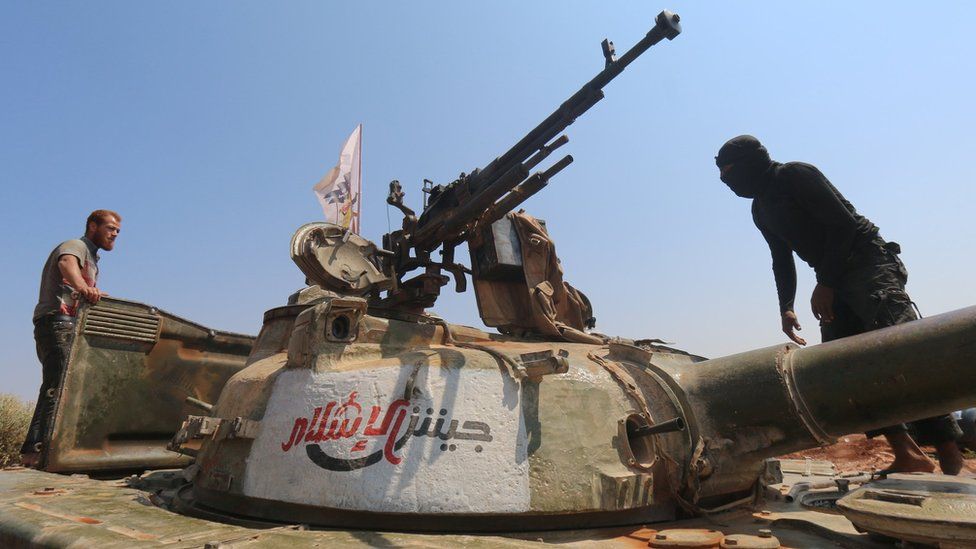Syrian opposition seeks unified front at Riyadh conference
- Published

Syria's disparate political and armed opposition factions are coming together in Saudi Arabia for a conference aimed at pursuing peace talks.
Representatives will attempt to agree a common position from which to negotiate with the government of Bashar al-Assad.
It is the first time most of the main rebel groups have been involved in peace moves since the conflict began.
World powers want peace talks between a unified opposition delegation and the government to start next month.
They see a political solution to the four-and-a-half-year conflict as an important step in a process that will eventually lead to the elimination of the self-styled Islamic State (IS), which controls large parts of northern and eastern Syria.
Kurds not invited
Most of the main rebel factions, such as Jaysh al-Islam and Ahrar al-Sham, are taking part in the conference in Riyadh, for which preparatory talks began on Tuesday.
Under Saudi auspices, they will be meeting opposition political leaders based mainly outside the country, and with the more moderate opposition tolerated by Damascus.
'A tall order' - Jim Muir, BBC News, Beirut
Given the sensitivity of the issues and the complexity of the players, the Riyadh talks will inevitably be shrouded behind thick veils, obscuring a lot of arguing, cajoling and blandishment.
It is important that it is the Saudis who are hosting the talks, the first of their kind to bring together many of the main strands of the rebel movement of which Riyadh is a key backer and financier.
The aim is to weld them into a coherent negotiating team for talks with the Syrian regime in early January.
A tall order, given that the main raison d'etre of the groups is to get rid of Bashar al-Assad, who has been given a new lease of life by Russian and Iranian intervention.
The Saudis and other backers of the opposition also want him gone. Have they been given assurances that there will be a date for his departure as a part of a political transition that only Moscow and Tehran could assure?
For the Americans and the other outside stakeholders in the Syria imbroglio, the Riyadh talks are a key step in a process that they hope will produce a settlement to defuse the Syrian civil war so that all the parties could then turn on Islamic State and eliminate it.
"Saudi is a pivotal state in the region and for it to take this step - to host a conference of the Syrian opposition factions - certainly something real will result from it," the head of a Western-backed Free Syrian Army (FSA) faction told the Reuters news agency.
The aim is to produce a unified delegation for negotiations with the government that all the outside powers involved in recent talks in Vienna, including Russia and Iran, want to see start by 1 January.
But the BBC's Jim Muir in Beirut says that is not going to be easy.
The groups, and their Saudi and other backers, want Mr Assad and his inner circle to go.
That is clearly not going to happen as a first step, but they will want assurances that it will happen as part of a transition process, our correspondent adds.
Al-Qaeda's affiliate in Syria, al-Nusra Front, has not been invited to Riyadh.
The jihadist group is regarded internationally as a terrorist organisation. But it is also part of a powerful alliance with some of the fighting groups that are taking part.
Who's attending the Riyadh conference?
The main Western-backed political alliance, the National Coalition for Syrian Revolutionary and Opposition Forces, supports the implementation of the 2012 Geneva Communique, which calls for the establishment of a transitional governing body in Syria. Its Turkey-based leadership insists that President Assad must go
The Syria-based opposition grouping, the National Co-ordination Committee for Democratic Change, calls for negotiations on a peaceful transition. It is tolerated by the government, though its members have been harassed and detained.
Ahrar al-Sham is a ultraconservative Islamist, or Salafist, rebel group that aims to topple Mr Assad and build an Islamic state. It is part of Jaysh al-Fatah, an alliance that includes the al-Qaeda-affiliated al-Nusra Front.
Jaysh al-Islam, a Islamist rebel group active mostly around Damascus, previously called for the establishment of an Islamic state. Its leader now says he favours allowing Syrians to decide what sort of state they want.
The Western-backed Southern Front alliance, which operates in the south, describes its self as "the moderate voice and the strong arm of the Syrian people".
The Syrian Kurds, who control large parts of northern Syria, have also not been invited. They are holding their own conference, at the same time, on the future of Syria.
Iran, a staunch ally of Mr Assad and a regional rival of Saudi Arabia, has said the meeting in Riyadh is aimed at harming the proposed peace talks.
The last talks aimed at ending the conflict in Syria broke down in February 2014 after only two rounds, with the UN blaming the government's refusal to discuss opposition demands.
In a separate development on Tuesday, Human Rights Watch said Jordan was blocking thousands of Syrian asylum seekers in deplorable conditions in remote desert areas just inside its border with Syria.
Aid workers said the vast majority of the 12,000 people in the areas were women and children who urgently needed more food, water and medical assistance, it added.
HRW called on the Jordanian authorities to swiftly allow them to reach the country's well-established transit centres.
- Published28 November 2015
- Published30 October 2015
- Published28 March 2018